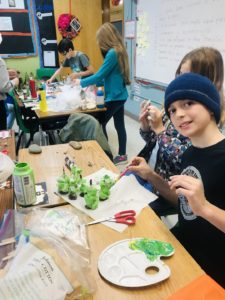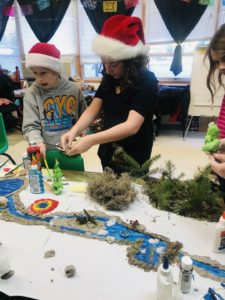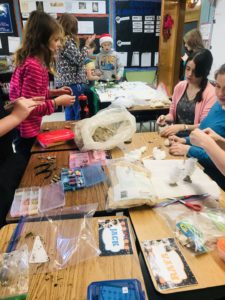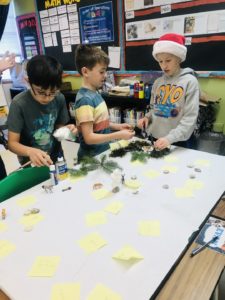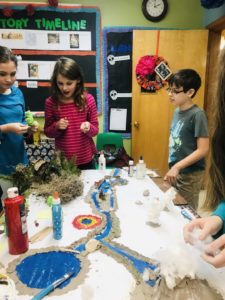La Lectura
• Identify the elements of a variety of literary genres: tales, poems, plays. Compare.
• Recognize, identify and admire the characteristics of lyric poetry and sonnet.
• Identify literary elements of poetry: rhyme scheme, meter, theme, word selection, figurative speech (metaphors and similes), personification, tone, etc.
• Take notes, summarize, restate, and paraphrase the key ideas of the text.
• Integrate knowledge and ideas and make text-to-text connections.
• Express ideas applying vocabulary with precision and accuracy at an academic level.
• Vocabulary and word studies: building academic vocabulary, roots of words.
• Grammar: Clauses and appositives. Understand how clauses and appositives can determine or complement the noun in a sentence.
• Spelling : Words with r y rr
• Identify the elements of a play.
La Obra de Teatro de nuestra clase
La clase 5/6 va a presentar una obra de teatro en jueves, el 13 de Diciembre a 2:30 PM. Es sobre la vida de Abe Lincoln y todos son invitados a venir a la cafeteria para verlo. Eso es el producto de mas de un mes de trabajo.
The 5/6 class is going to present a play on thursday, the 13 of december at 2:30 PM. It is about the life of Abe Lincoln, and everyone is invited to join us in the cafeteria. What you will view is the end product of more than a month of work.
Ciencias
End of Science Module Project: Ecoscenarios
Students are introduced to ten new ecosystems in the U.S. and Puerto Rico. Each student will be given an ecosystem to study. They use a variety of resources, including the Internet and print materials, to work on their research of the ecosystems. The ecosystems all have an issue that poses a potential threat to the vitality of the system, such as acid rain, mineral extraction, habitat reduction, and so on. Students investigate and describe the ecosystem, including food webs and abiotic factors. Each student prepares an individual report and participates in a presentation of its findings. Students were given their topic of study on Friday. This project will be done in class next week, however, students are encouraged to do research and elaborate on this project at home so they are prepared for class work.
Mathematics
This week we wrapped up our chapter on Rates. Our objectives were:
- Solve rate problems including unit pricing and constant speed
- Solve problems involving rates and unit rates
- Demonstrate knowledge on the chapter test
History & Geography
 This week we began learning about the Enlightenment. Our objectives were:
This week we began learning about the Enlightenment. Our objectives were:
- Place the Enlightenment and its emphasis on science and human reason in historical context, and contrast the period with the Middle Ages and the Renaissance
- Explain how Newton’s scientific achievements influenced Enlightenment thinkers.
- Explain why Descartes is considered the father of modern philosophy.
- Explain Thomas Hobbes’s conclusions about human nature.
English Writing & Spelling
Our objectives for writing were:
- To begin working individually on second narrative writing prompt
Greek and Latin:
- Because students will be working on 2 more narrative writing pieces before winter break students will only be receiving their Greek and Latin roots packets these next few weeks
- In this weeks packet students focused on the roots vis, phon, and audi
Specialists
Character Education with Ms. Jennie
This month our theme is GENEROSITY. This past week we discussed different ways we can be generous out in the real world, such as buying a coffee for the person behind you in line, inviting a neighbor over for dinner, giving out snack bags to the homeless, or participating in a giving tree like we are doing at SWS. Our quote of the month is by Thomas Jefferson: “I believe that every human mind feels pleasure in doing good to another.” And we are reading a poem called Little Tree by e. e. cummings to celebrate the holiday season. We continue to read our chapter books in class too and do vocabulary, comprehension, and reader’s theatre.

